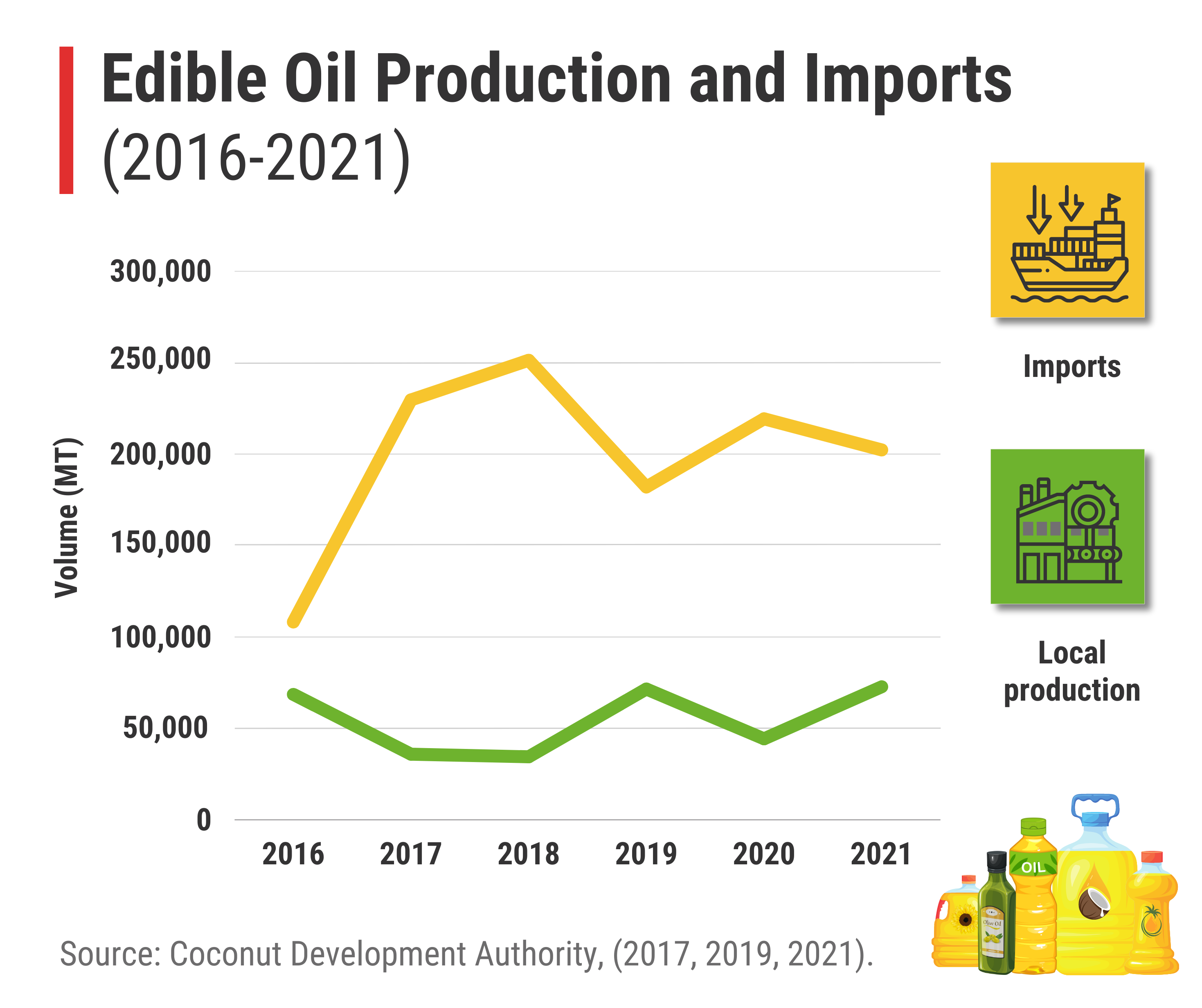Dr Erandathie Pathiraja, Research Fellow at the Institute of Policy Studies of Sri Lanka (IPS), provides valuable insights into the recently published IPS study, ‘Palm Oil Industry in Sri Lanka: An Economic Analysis’. The study authored by Dr. Erandathie Pathiraja, Ruwan Samaraweera, Hiruni Fernando, and Jaan Bogodage, offers a comprehensive analysis of the economic and environmental impacts of the palm oil industry in Sri Lanka.
In the following Q&A session, Dr Pathiraja shares her perspectives on the reasons behind the ban on oil palm cultivation, the potential impact on the economy and environment, the industry's economic contributions, environmental concerns and their mitigation, health issues related to edible oil consumption, and alternative solutions to meet the local edible oil demand.
Q: In light of the recent ban on oil palm cultivation in Sri Lanka, there has been much debate surrounding the decision. Could you share your insights on the reasons behind the ban and its potential impact on the economy and environment?
The palm oil industry in Sri Lanka has been an import substitution policy initiative aimed at reducing palm oil imports and boosting the economy. The 2021 ban on oil palm cultivation in Sri Lanka was primarily driven by concerns over its long-term environmental impact, owing to "soil erosion, drying of springs thus, affecting biodiversity and life of the community". The policy further directs systematically removing the existing plantations and nurseries at an annual rate of 10% and replacing these with rubber or any other cultivation favourable for water resources.
The ban aims to shift the country towards more sustainable agricultural practices and protect Sri Lanka's natural resources. In addition, by diversifying agricultural production, Sri Lanka aims to reduce its dependence on palm oil imports and strengthen domestic industries.
The ban on oil palm cultivation has generated mixed opinions and sparked debates. Some argue it could negatively affect the economy, as palm oil contributes to Sri Lanka's edible oil requirements. The ban may increase reliance on imports, potentially impacting the country's trade balance and food security. Furthermore, the ban has raised concerns among the Regional Plantation Companies (PRCs), who have already invested in cultivation and processing. Against such a backdrop, our study aims to revisit the reasons for the ban on oil palm cultivation and arguments against the ban focusing on economic, environmental, health and social factors.
Q: The study reveals that the palm oil industry in Sri Lanka contributes significantly to the economy. Could you shed some light on the economic aspects highlighted in the study and the potential benefits to the country?
Certainly, the study demonstrates that the palm oil industry in Sri Lanka currently saves approximately USD 17 million annually in foreign exchange outflows and meets around 6% of the domestic edible oil demand. Moreover, it generates employment for over 33,000 individuals and attracts a capital investment of LKR 23 billion. These numbers illustrate the industry's positive economic impact, but we must also consider the long-term sustainability and environmental impacts.
Q: Environmental concerns surrounding oil palm cultivation have been a major point of contention. What are some of the specific environmental issues associated with the industry, and how can they be addressed?
Oil Palm cultivation has faced criticism globally due to its environmental impacts primarily linked to deforestation. Some of the specific criticisms include groundwater depletion, water quality degradation, regeneration, siltation, floods, landslides, and palm oil mill effluent handling. These issues directly affect the surrounding communities and ecosystems.
In Sri Lanka, RPCs were allowed to cultivate oil palms in marginal rubber lands. Therefore, deforestation is not relevant unless rubber is considered a forest tree. Environmental issues are common to any agricultural land use and are observed in oil palm cultivation. However, the degree of impact varies depending on factors such as high input consumption (due to high oil productivity), vertical and horizontal root systems, and management practices. Global literature on these studies remains inconclusive due to their context-specific nature and lobby group research. Therefore, conducting further investigations and closely monitoring these issues within the local context is crucial to make informed decisions.
Implementing sustainable management practices, periodic monitoring, and potentially financing the environmental costs through mechanisms like import Cess or domestic levy can mitigate the negative externalities. However, monitoring smallholder cultivations would be challenging in the absence of policy provisions. Balancing economic benefits with environmental sustainability is key to a responsible palm oil industry.
Q: The study also mentions health concerns related to edible oil consumption. Could you elaborate on these concerns and propose possible solutions to address them effectively?
The study highlights that local edible oil consumption in Sri Lanka poses serious health risks due to improper processing, storage, and potential adulteration with repeatedly used oils. Therefore, addressing these issues at the forefront is crucial to overcome these hazards. This can be achieved by enforcing proper quality checks during importation and local edible oil production, ensuring adherence to processing and storage regulations, and avoiding repeatedly used oils. Additionally, it is equally important to raise public awareness about these aspects. By prioritising these measures, we can mitigate the health hazards associated with edible oil consumption and ensure public safety.
Q: Given the ban on oil palm cultivation, what alternatives exist to meet the local edible oil demand in Sri Lanka?

Meeting the local edible oil demand in Sri Lanka is indeed a challenge without imports. Nearly 74% of the demand is met through imports. Local palm oil supplies 6% and the rest is through local coconut oil, which varies with annual coconut production. While coconut oil is often considered a substitute, the current coconut production capacity is inadequate and does not remain a perfect substitute for industrial needs owing to different properties and prices. Given the limited land availability for expanding commercial cultivations in Sri Lanka for coconut and oil palm, productivity improvements would support partially bridging the gap. This can be facilitated by lowering the import tariff on edible oils, easing the burden on consumers. Adopting modern and safe oil production technologies such as virgin coconut oil and promoting high value-added products such as lauric acid for the export market are crucial to mitigate the impact on the coconut oil industry. Considering the economic crisis and foreign exchange deficit, a comprehensive evaluation of feasible alternatives is necessary.
Access the full report here: https://www.ips.lk/palm-oil-industry-in-sri-lanka-an-economic-analysis-2/

Erandathie Pathiraja is a Research Economist at the Institute of Policy Studies of Sri Lanka (IPS) with research interests in the analysis of industries and markets, competitiveness and SMEs. She holds a BSc in Agriculture from the University of Peradeniya, an MPhil in Agricultural Economics from the Postgraduate Institute of Agriculture, and a PhD in Agricultural Economics from The University of Melbourne, Australia. (Talk with Erandathie - erandathie@ips.lk)
